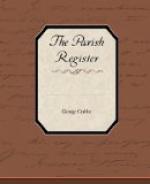Her father’s pride, become his harlot’s
prey.
Throughout the lanes she glides, at evening’s close,
And softly lulls her infant to repose;
Then sits and gazes, but with viewless look,
As gilds the moon the rippling of the brook;
And sings her vespers, but in voice so low,
She hears their murmurs as the waters flow:
And she too murmurs, and begins to find
The solemn wanderings of a wounded mind.
Visions of terror, views of woe succeed,
The mind’s impatience, to the body’s need;
By turns to that, by turns to this a prey,
She knows what reason yields, and dreads what madness may.
Next, with their boy, a decent couple came,
And call’d him Robert, ’twas his father’s name;
Three girls preceded, all by time endear’d,
And future births were neither hoped nor fear’d:
Blest in each other, but to no excess,
Health, quiet, comfort, form’d their happiness;
Love all made up of torture and delight,
Was but mere madness in this couple’s sight:
Susan could think, though not without a sigh,
If she were gone, who should her place supply;
And Robert, half in earnest, half in jest,
Talk of her spouse when he should be at rest:
Yet strange would either think it to be told,
Their love was cooling or their hearts were cold.
Few were their acres,—but, with these content,
They were, each pay-day, ready with their rent:
And few their wishes—what their farm denied,
The neighbouring town, at trifling cost, supplied.
If at the draper’s window Susan cast
A longing look, as with her goods she pass’d,
And, with the produce of the wheel and churn,
Bought her a Sunday—robe on her return;
True to her maxim, she would take no rest,
Till care repaid that portion to the chest:
Or if, when loitering at the Whitsun-fair,
Her Robert spent some idle shillings there;
Up at the barn, before the break of day,
He made his labour for th’ indulgence pay:
Thus both—that waste itself might work in vain —
Wrought double tides, and all was well again.
Yet, though so prudent, there were times of joy,
(The day they wed, the christening of the boy.)
When to the wealthier farmers there was shown
Welcome unfeign’d, and plenty like their own;
For Susan served the great, and had some pride
Among our topmost people to preside:
Yet in that plenty, in that welcome free,
There was the guiding nice frugality,
That, in the festal as the frugal day,
Has, in a different mode, a sovereign sway;
As tides the same attractive influence know,
In the least ebb and in their proudest flow;
The wise frugality, that does not give
A life to saving, but that saves to live;
Sparing, not pinching, mindful though not mean,
O’er all presiding, yet in nothing seen.
Recorded next a babe of love I trace!
Of many loves, the mother’s fresh disgrace. —
“Again, thou harlot! could not all thy pain,
Throughout the lanes she glides, at evening’s close,
And softly lulls her infant to repose;
Then sits and gazes, but with viewless look,
As gilds the moon the rippling of the brook;
And sings her vespers, but in voice so low,
She hears their murmurs as the waters flow:
And she too murmurs, and begins to find
The solemn wanderings of a wounded mind.
Visions of terror, views of woe succeed,
The mind’s impatience, to the body’s need;
By turns to that, by turns to this a prey,
She knows what reason yields, and dreads what madness may.
Next, with their boy, a decent couple came,
And call’d him Robert, ’twas his father’s name;
Three girls preceded, all by time endear’d,
And future births were neither hoped nor fear’d:
Blest in each other, but to no excess,
Health, quiet, comfort, form’d their happiness;
Love all made up of torture and delight,
Was but mere madness in this couple’s sight:
Susan could think, though not without a sigh,
If she were gone, who should her place supply;
And Robert, half in earnest, half in jest,
Talk of her spouse when he should be at rest:
Yet strange would either think it to be told,
Their love was cooling or their hearts were cold.
Few were their acres,—but, with these content,
They were, each pay-day, ready with their rent:
And few their wishes—what their farm denied,
The neighbouring town, at trifling cost, supplied.
If at the draper’s window Susan cast
A longing look, as with her goods she pass’d,
And, with the produce of the wheel and churn,
Bought her a Sunday—robe on her return;
True to her maxim, she would take no rest,
Till care repaid that portion to the chest:
Or if, when loitering at the Whitsun-fair,
Her Robert spent some idle shillings there;
Up at the barn, before the break of day,
He made his labour for th’ indulgence pay:
Thus both—that waste itself might work in vain —
Wrought double tides, and all was well again.
Yet, though so prudent, there were times of joy,
(The day they wed, the christening of the boy.)
When to the wealthier farmers there was shown
Welcome unfeign’d, and plenty like their own;
For Susan served the great, and had some pride
Among our topmost people to preside:
Yet in that plenty, in that welcome free,
There was the guiding nice frugality,
That, in the festal as the frugal day,
Has, in a different mode, a sovereign sway;
As tides the same attractive influence know,
In the least ebb and in their proudest flow;
The wise frugality, that does not give
A life to saving, but that saves to live;
Sparing, not pinching, mindful though not mean,
O’er all presiding, yet in nothing seen.
Recorded next a babe of love I trace!
Of many loves, the mother’s fresh disgrace. —
“Again, thou harlot! could not all thy pain,




